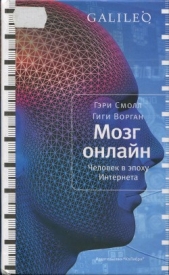Мозг онлайн. Человек в эпоху Интернета

Мозг онлайн. Человек в эпоху Интернета читать книгу онлайн
Сегодня мы уже не можем себе представить жизнь без компьютеров и Интернета. Каждый день возникают все новые и новые гаджеты, которые во многом определяют наше существование — нашу работу, отдых, общение с друзьями. Меняются наши реакции, образ мышления. Известный американский психиатр, профессор Лос-Анджелесского университета и директор Научного центра по проблемам старения Гэри Смолл вместе со своим соавтором (и женой) Гиги Ворган утверждают: мы наблюдаем настоящий эволюционный скачок, и произошел он всего за пару-тройку десятилетий!
В этой непростой ситуации, говорят авторы, перед всем человечеством встает трудная задача: остаться людьми, не превратившись в придаток компьютера, и не разучиться сопереживать, общаться, любить…
Внимание! Книга может содержать контент только для совершеннолетних. Для несовершеннолетних чтение данного контента СТРОГО ЗАПРЕЩЕНО! Если в книге присутствует наличие пропаганды ЛГБТ и другого, запрещенного контента - просьба написать на почту [email protected] для удаления материала
148. Allison S. E., von Wahlde L., Shockley Т., Gabbard G. O. The development of the self in the era of the Internet and roleplaying fantasy games. American Journal of Psychiatry 2006; 163:381-385
149. Samuelson R. J. The vanishing greenback. Newsweek. June 25, 2007
150. Horrigan J., Rainie L. The Internet’s growing role in life’s major moments. Pew Internet & American Life Project. April 19, 2006, www.pewinternet.org/PPF/r/181/reportdisplay.asp
151. Anderson C. The Long Tail: Why the Future of Business Is Selling Less of More. Hyperion, New York, 2006
152. Born С., Meindl Т., Poeppel E., et al. Brand perception: Evaluation of cortical activation using fMRI. Annual Meeting of the Radiological Society of North America November 28, 2006, http://rsna2006.rsna.org/rsna2006/V2006/conference/event_display.cfm?em_id=4429416
153. Andrew Keen describes the negative cultural impact:
Keen A. The Cult of the Amateur: How Today’s Internet is Killing our Culture. Doubleday, New York, 2007
154. www.alexa.com/site/ds/top_sites?cc=US&ts_mode=country&lang=none
155. Netcraft.com, http://news.netcraft.com/archives/web_server_survey.html
156. Gomes L What are Web surfers seeking? Well, it’s just what you’d think. The Wall Street Journal. August 16, 2006
157. Arrington M. Yahoo top searches 2007: Please, people, stop typing Britney Spears into search boxes. TechCrunch. December 3, 2007. www.techcrunch.com/2007/12/03/yahoo-top-searches-2007-please-people-stop-typing-britney-spears-into-search-boxes/
Arrington M. Google announces fastest growing search terms. TechCrunch. December 3, 2007. www.techcrunch.com/2007/12/03/google-announces-fastest-growing-search-terms
Mills E. Ask.com’s top 10 has Google, but no Britney. CNet News.com. December 14, 2007. Avalable online: www.news.com/8301-10784_3-9834449-7.html
158. 2005 Online Holiday Shopping Update. November 27, 2005, www.comscore.com/press/release.asp?-press=683
159. Lenhart L Selling items online. Pew Internet & American Life Project. November, 2005, www.pewinternet.org/pdfs/PIP_SellingOnline_Novo5.pdf
160. Know N. Home shoppers do their hunting online. USA Today. February 9, 2007
161. Knutson R, Rick S., Wimmer G. E., Prelec D., Loewenstein G. Neural predictors of purchases. Neuron 2007; 53:147-156
162. Lohr S. Study says computers give big boosts to productivity. The New York Times. March 13, 2007.
163. Samuelson R. J. The vanishing greenback. Newsweek. June 25, 2007.
164. Naik G. Faltering family MDs get technology lifeline. The Wall Street Journal. February 26, 2007.
165. Duhigg C. Hospital clients nurture firm's scheduling software. Los Angeles Times. June 21, 2006.
166. Interactive Marketing & Media Fact Pack 2006. Crain Communications Inc. April 17, 2006, http://adage.com/images/random/Interactivefactpacko6.pdf
167. Darlin D. Using the Web to get the boss to pay more. The New York Times. March 3, 2007
168. Atkinson R. D., McKay A. Digital prosperity: Understanding the economic benefits of the information technolog у revolution. The Information Technology & Innovation Foundation. March 2007, http://www.itif.org/files/digital_prosperity.pdf
169. Kuhnen C. M., Knutson B. The neural basis of financial risk taking. Neuron 2005; 47:763-770
170. Hsu М., Bhatt М., Adolphs R., Tranel D., Camerer C. F. Neural systems responding to degrees of uncertainty in human decision-making. Science 2005; 310: 1680-1683
171. NAA releases ABC FAX-FAX analysis, www.naa.org/Global/PressCenter/2006/NAA-RELEASES-ABC-FAS-FAXANALYSIS.aspx?lg=naaorg
172. Carr D. Threatened by the Internet, Time Magazine slims down. The New York Times. January 8, 2007
173. Ciepły M. New show to begin on MySpace. The New York Times. September 13, 2007
174. Online ad revenue sets record for a third year. The Wall Street Journal. March 8, 2007
175. Kehaulani Goo S. Google gambles on Web video. The Washington Post. October 10, 2006, http://www.washington-post.com/wp-dyn/content/article/2006/10/09/AR2006100900546.html
176. Fallows D. How men and women use the Internet. Pew Internet & American Life Project. Washington, DC, 2005.
177. Baron-Cohen S., Knickmeyer R. C., Belmonte M. K. Sex differences in the brain: Implications for explaining autism. Science 2005; 4:310:819-823
178. Haier R. J., Jung R. E., Yeo R. A., Head K., Alkire M. T. The neuroanatomy of general intelligence: sex matters. Neuroimage 2005; 25:320–327.
179. Fallows D. How men and women use the Internet. Pew Internet & American Life Project. Washington, DC, 2005
180. The mismeasure of woman. The Economist. August 3, 2006, www.economist.com/science/displaystory.cfm?story_id=7245949
181. Fulkerson J.A., Story М., Mellin A., Leffert N.. Neumark-Sztainer D., French S. A. Family dinner meal frequency and adolescent development: Relationships with developmental assets and high-risk behaviors. Journal of Adolescent Health 2006; 39:337-345
182. Madden М., Lenhart A. Online dating. Pew Internet & American Life Project. March 5, 2006, www.pewinternet.org/pdfs/PIP_Online_Dating.pdf
183. Zaslow J. Digital love letters are easy to send but hard to cherish. The Wall Street Journal. February 9, 2007
184. Fisher H. E., Aron A., Brown L. L. Romantic love: A mammalian brain system for mate choice. Philosophical Transactions of the Royal Society of London. Series B. Biological Sciences 2006: 361: 2173-2186
185. Hafner K. Laptop slides into bed in love triangle. The New York Times. August 24, 2006.
186. Zeller T. Your life as an open book. The New York Times. August 12, 2006.
187. National Center for Health Statistics. Electronic medical record use by office-based physicians: United States, 2005, www.cdc.gov/nchs/products/pubs/pubd/hestats/electronic/electronic.htm
188. Stone J. H. Communication between physicians and patients in the era of e-medicine. The New England Journal of Medicine, 2007; 356:2451-2454
189. Dell К., Cullen LT. Snooping bosses. Time. September 11, 2006, http://www.workrights.org/in_the_news/in_the_news_time.html


























